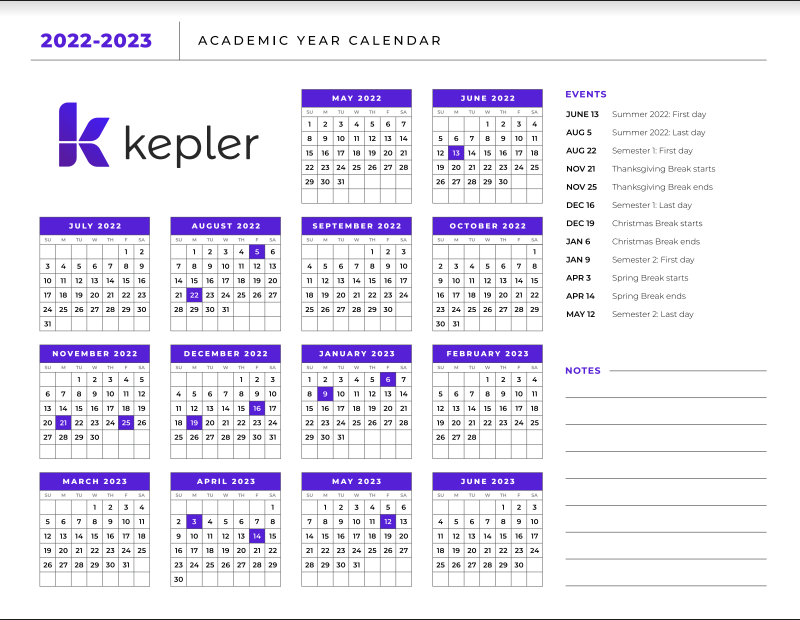
A Change in the Academic Calendar for 2022-2023
February 17th, 2022
Marking Time
As most are aware, a calendar is a way of marking time by reference to important events in our lives. What many may not immediately recognize, however, is the way in which a calendar is liturgical.
The word liturgy comes from the Medieval Latin liturgia meaning "public service, public worship," and the Latin word is derived from the similar Greek word leitourgia meaning "a public duty or ministry.“
Understanding the etymology of the word makes it easier to see why and how we talk about the liturgy practiced in our faith traditions, liturgical prayers, and the liturgical Calendar of the Christian Church.
Using a liturgical calendar that marks time by reference to the life of Christ has very deep roots in early Christianity and it has been a tradition most Christians have followed up until the modern epoch. Following or at least recognizing the liturgical calendar not only connects us to Christians from the past, it also demonstrates the catholicity of the church as we mark time together with believers from other traditions.
Like liturgical prayers or church liturgies in formal worship, a liturgical calendar shapes our common thinking about the way we should live and worship together by marking time according to those most important events surrounding the life of Christ.
This raises the idea of the modern secular calendar. A cursory look that calendar shows what is important for American civic life by marking time according to the priorities of the state (e.g., Memorial Day, Veteran’s Day, and Labor Day).
One can even see how a society seeks to reshape its cultural identity by changing the days it marks as important. The most stark example in recent decades is the shift from celebrating Columbus Day to celebrating Martin Luther King, Jr. Day. Calendars both reflect and shape the nation's corporate cultural values.
And that leads to the most important point of this update, a change in the Kepler calendar this fall that will mark time in a way that better reflects our values as a classical Christian education platform that serves homeschooling families.
Mark Twain once said that the only people who like change are wet babies, so it's possible to recognize that a change in the Kepler academic calendar this fall may seem to be inconvenient for a few—though doubtfully inconvenient for most. Nevertheless, the benefits the change will bring, along with the message it communicates about Kepler's values, are incomparable to the potential slight inconvenience.
The Calendar Change
Beginning with the Fall 2022 academic year, Kepler classes will commence two weeks earlier, beginning the week of August 22nd instead of the week of September 5th as we have done in previous years.
This two-week earlier start time will afford at least three benefits.
The first benefit is to allow the first semester of classes to be completed before students and teachers go on Christmas break instead of two weeks after they come back. Every student will immediately recognize the relief and joy that will bring.
The second benefit is an extension of the Christmas break from two weeks to three weeks long. Two weeks at the end of December and the first week of the New Year.
And the third benefit will be a two-week Spring break that starts the week before Easter and concludes the week after Easter.
And classes will still finish the second week of May as they have in previous Years.
The change is far enough out from the fall semester, it is believed this change will not affect most families negatively and the great benefits just described will outweigh any small inconvenience. Most importantly, the change in the academic schedule will better reflect the values of the homeschool families Kepler serves and the values Kepler embodies—both academically and spiritually—as a Classical Christian education platform.
The updated academic calendar can now be found in the footer of the website and soon all the classes listed on the platform will reflect the new start time as well.
As always, if you have any questions, don’t hesitate to contact our President, Scott Postma at scott@kepler.education. For questions about enrolling in classes or how the change may affect your family, please contact our Chief Academic Advisor, Joffre Swait, at joffre@kepler.education.